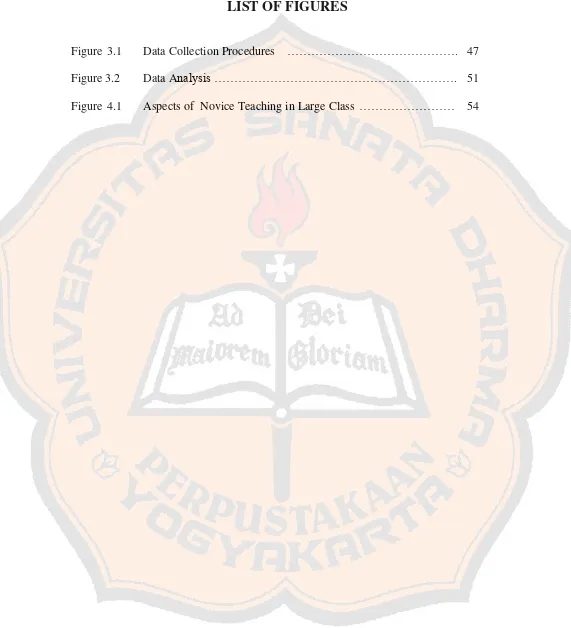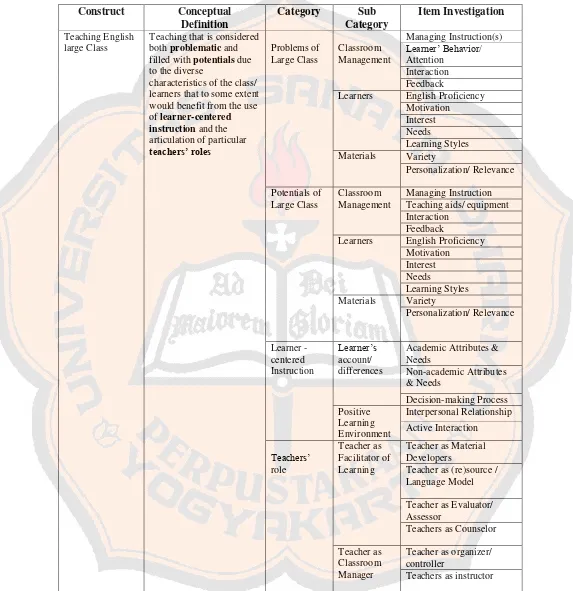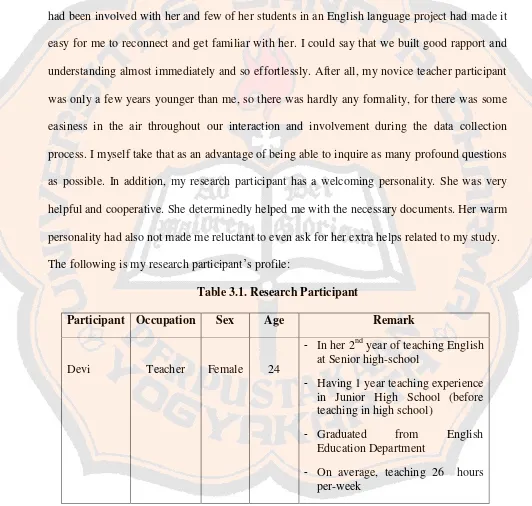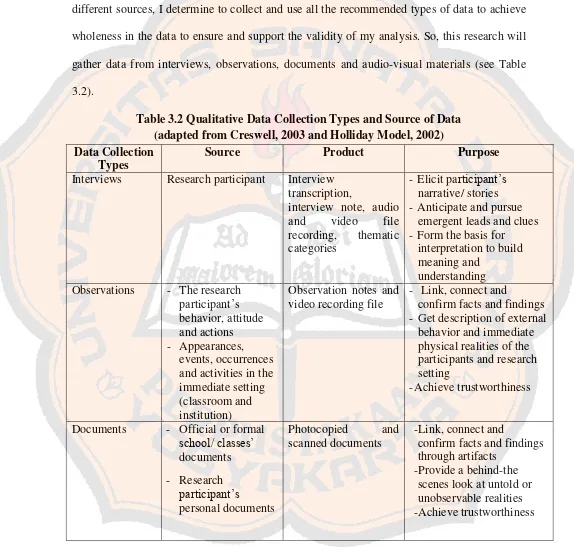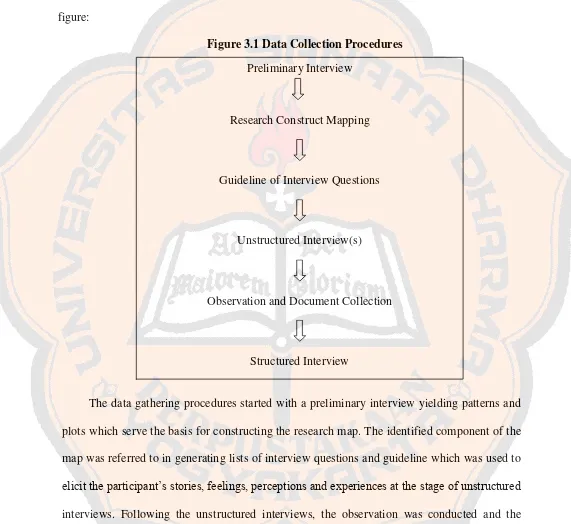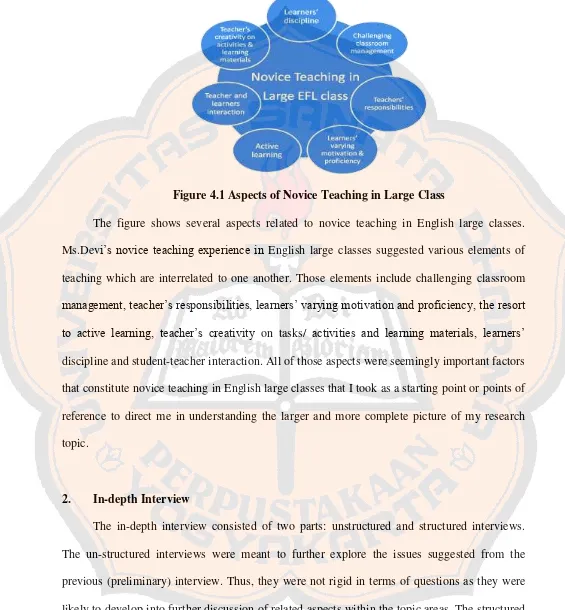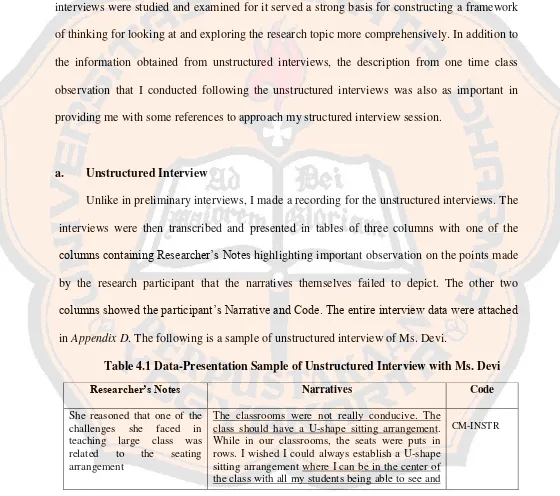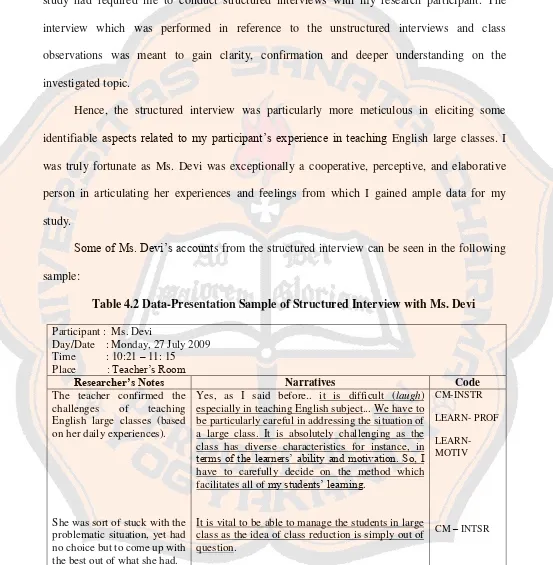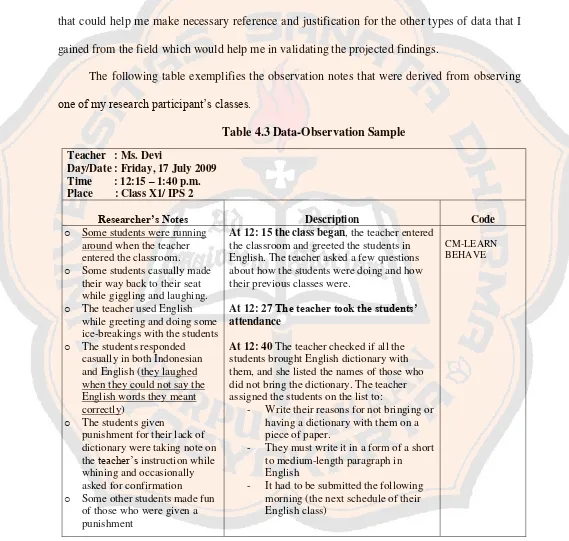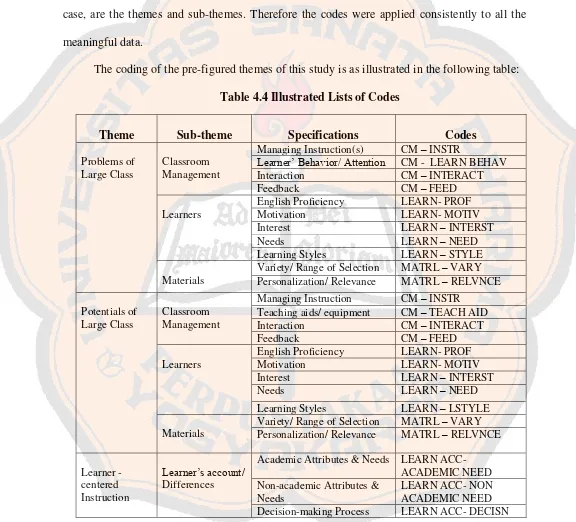i
THE MEANING OF TEACHING ENGLISH LARGE CLASSES
TO A NOVICE TEACHER
A THESIS
Presented as a Partial Fulfillment of the Requirements to Obtain the Magister Humaniora (M.Hum) Degree
in English Language Studies
by
IRMA WINDY ASTUTI
Student Number : 056332008
THE GRADUATE PROGRAM IN ENGLISH LANGUAGE STUDIES SANATA DHARMA UNIVERSITY
vi
ACKNOWLEDGMENTS
First of all, thanks to Allah S.W.T for all His guidance and blessing through all the hardship encountered whilst completing this thesis.
I am heartily thankful to my supervisor, Dr. J. Bismoko, to whom I owe a great intellectual debt and whose valuable assistance has enabled me to develop a sound understanding of the subject for the completion of this thesis.
I am also indebted to all my lecturers in the Graduate Program of English Language Studies of Sanata Dharma University for the insights, aspirations and wisdoms they have shared.
I would also like to thank my beloved family: My father Hari Sisworo, my mother Ibu Winarsih, my Grandfather Soenaryo, my sister Fitria Indri Astuti and my brother Dhymas Arie Wibowo for their unfailing love, support and prayers for me during my study and as I hurdle all the obstacles in the completion of this research work.
I would also like to express my most sincere gratitude to all my colleagues in English Study Program Diploma III of Faculty of Psychology and Socio-cultural Sciences of Islamic University of Indonesia (UII), the former dean and all the faculty members for their steadfast understanding and encouragement.
To all my wonderful classmates: Ista, Yanti, Slash, Jeannette, Dyah, Anis and others, I am much touched by your earnest and lasting friendship and I truly treasure every moment we have spent and shared together especially during our study.
vii
TABLE OF CONTENTS
TITLE PAGE ... i
APPROVAL PAGE ... ii
DEFENSE APPROVAL PAGE ... iii
STATEMENT OF ORIGINALITY ... iv
LEMBAR PERNYATAAN………. v
ACKNOWLEDGEMENTS ... vi
TABLE OF CONTENTS ... vii
LIST OF TABLES ... xi
LIST OF FIGURES ... xii
LIST OF PICTURE ... xiii
ABSTRACT ... xiv
ABSTRAK ... xvi
CHAPTER I INTRODUCTION ... 1
A. BACKGROUND ... 1
B. PROBLEM IDENTIFICATION ... 5
C. PROBLEM LIMITATION ... 6
D. RESEARCH QUESTION ... 7
E. RESEARCH GOALS ... 8
F. RESEARH BENEFITS ... 8
CHAPTER II LITERATURE REVIEW ... 11
A. THEORETICAL REVIEW ... 11
1. Language Teaching Experience ... 12
a. Experience ... 12
b. Teaching ... 13
c. Teaching Foreign Language ... 15
d. Roles of Teacher ... 17
viii
a. Characteristics of Novice Teacher ... 19
b. Knowledge and Skill Base of Novice Teacher ... 20
3. Large Class ... 22
a. Characteristics of Large Classes ... 22
b. Problems and Potentials of large Classes ... 24
c. Learner-centered Instruction ... 26
B. THEORETICAL FRAMEWORK ... 27
CHAPTER III RESEARCH METHODOLOGY ... 31
A. RESEARCH DESIGN ... 31
B. SETTING ... 36
C. RESEARCH PARTICIPANTS ... 37
D. TYPES OF DATA AND DATA SOURCE ... 39
E. DATA COLLECTION TECHNIQUE ... 41
F. TECHNIQUE OF DATA ANALYSIS ... 48
G. TRUSTWORTHINESS ……… 50
CHAPTER IV ANALYSIS ... 52
A. DATA PRESENTATION ... 53
1. Preliminary Interview ……….. 52
2. In-depth Interview ……… 54
a. Unstructured Interview ……… 55
b. Structured Interview ……… 57
3. Observation ……….………. 58
4. Documents ……… 63
5. Coding and Thematizing ……….. 64
B. INTERPRETATION... 70
1. Pre-figured Themes ... 70
a. Problems of Large Classes ... 70
ix
2) Problems of Learner ... 73
3) Problems of Material ... 74
b.Potentials of Large Classes ... 75
1) Potentials of Classroom Management ... 75
2) Potentials of Learner ... 77
3) Potentials of Material ... 78
c. Learner-Centered Instruction ... 79
1) Learner’s Account ... 80
2) Positive Learning Environment ... 81
d.Teacher’s Roles ... 82
1) Teacher as Facilitator of Learning and Classroom Manager .... 82
2) Teacher with Special Roles ... 84
e. Pedagogical Skills (Theory – Practice Mismatch) ... 85
f. Psychological/ Affective Factor ... 87
1) Teaching Conduct ... 87
2) Teaching-related Conduct ... 88
2. Emergent Themes ... 89
a. Teacher’s Roles ... 89
1) Teacher as Negotiator ... 89
2) Teacher as Peer ... 91
b.Self ... 91
1) Personal Maxim ... 91
2) Reflective Teaching ... 93
3) Decision Making ... 93
4) Autonomy/ Empowerment ... 94
5) Problem Solving ... 95
6) Motivation ... 96
SUMMARY ... 97
x
CONCLUSION ... 99
IMPLICATION ... 101
RECOMMENDATION ... 102
BIBLIOGRAPHY ... 103
APPENDICES ... 106
Appendix A Interview Question Blueprint ... 106
Appendix B Interview Protocol ... 114
Appendix C Preliminary Interview ... 115
Appendix D Interview Transcription ... 117
1.Unstructured Interview ... 117
2.Structured Interview ... 130
Appendix E Class Observation ... 149
Appendix F Teacher’s Documents ... 153
1. Sample of Subject/ Course Outline ... 153
2. Information of English Class Remedy ... 157
xi
LIST OF TABLES
Table 2.1 Research Construct Mapping ………. 29
Table 3.1 Research Participant ………. 38
Table 3.2 Data Collection Types and Source of Data ...………. 40
Table 4.1 Data Presentation Sample of Unstructured Interview with Ms. Devi 55 Table 4.2 Data Presentation Sample of Structured Interview with Ms.Devi… 57 Table 4.3 Data Observation Sample ………. 59
Table 4.4 Illustrated Lists of Codes ……….. 65
Table 4.5 Illustrated List of Emergent Themes ……….. 67
Table 4.6 Illustration of Further Coding ……… 69
xii
LIST OF FIGURES
Figure 3.1 Data Collection Procedures ………. 47
Figure 3.2 Data Analysis ………. 51
xiii
LIST OF PICTURES
xiv
ABSTRACT
Irma Windy Astuti. 2010. The Meaning of Teaching English Large Classes to a Novice Teacher: Narrative Research. Yogyakarta: Sanata Dharma University.
The challenges that teachers of English as a World Language encountered in their profession are unquestionably numerous. One of the most challenging teaching situations is the one involving novice or beginning English teachers teaching in a challenging classroom environment such as those of large classes. I intend to explore and discuss teaching English large classes to a novice teacher. I particularly aim at investigating what the teacher thinks about teaching English large classes, how she gives meaning to it, how she conducts and approaches her teaching, how she experiences success and failure, what she learns from it to become more empowered and self-fulfilling
This research is progressive qualitative research. The data, in a form of texts, were presented and analyzed based on the narratives of the research participant. The use of narrative research inquiry is intended to seek insightful meanings and understandings of the individual’s perceptions and meaningful experience on teaching English large classes. Accordingly, real stories, rich experiences, multiple perceptions, and multifaceted interpretation of the participant’s teaching experience would be altogether used to construct meanings in order to better understand the essence and the reality of their teaching enterprise.
The participant was a novice teacher in her second year of teaching English in a private secondary/ senior high school whose classes are identified as large. The texts were taken from in-depth interviews (un-structured and structured interviews) with the participant, class observations and document collection. Some of the texts were recorded, video-taped, transcribed, photocopied and scanned. They were analyzed through recurring process of reading, transcribing, coding, and categorizing involving careful selection and reduction. Consequently, the pre-figured themes of problems of large class, potentials of large class, learner-centered instruction, teacher’s role, pedagogical mismatch and psychological/ affective factors were presented, discussed, analyzed and interpreted along with the emergent categories.
The findings which I expect from this study are hoped to be build a better understanding of teaching English large classes to a novice teacher which in turn is also likely benefit her in improving and developing herself professionally. The implications of the findings is likely to suggest thoughtful, reflective and accommodating teaching practice with regards to facilitating effective learning and providing positive learning environment for learners of English large classes. Another implication would address the importance of considering the link and match between pedagogical or EFL theories and a real-teaching practice undergone by novice teachers.
xv
xvi
ABSTRAK
Irma Windy Astuti. 2010. The Meaning of Teaching English Large Classes to a Novice Teacher: Narrative Research. Yogyakarta: Sanata Dharma University.
Terdapat banyak kesulitan yang dihadapi oleh guru bahasa Inggris sebagai bahasa international dalam profesi mengajar mereka. Salah satu dari kesulitan yang paling besar adalah yang berkaitan dengan pengalaman mengajar guru baru atau novice teacher yang mengajar di kelas besar. Saya bermaksud untuk menggali dan mendiskusikan makna dari mengajar kelas besar terhadap guru baru. Saya secara khusus tertarik untuk mengetahui lebih jauh apa yang dipikirkan oleh guru baru mengenai mengajar bahasa Inggris di kelas besar; bagaimana ia memberikan makna terhadap proses mengajar tersebut; bagaimana ia melakukan proses mengajar; bagaimana ia mengalami kesuksesan dan kegagalan dalam mengajar; dan apa yang ia pelajari dari itu semua untuk bisa menjadikannya lebih mandiri dan berkembang.
Penelitian ini adalah penelitian progresif kualitatif. Data yang diperoleh berupa atau dalam bentuk teks yang disajikan dan dianalisa berdasarkan narasi dari partisipan penelitian. Disain penelitian dengan menggunakan strategi pendekatan naratif (narrative research inquiry) yang digunakan untuk mencari tahu makna terdalam dan pemahaman dari persepsi seseorang dan pengalaman yang memberikan arti penting bagi dirinya berkaitan dengan pengajaran bahasa Inggris di kelas besar. Berkaitan dengan hal tersebut, kisah nyata, pengalaman hidup yang kaya dan interpretasi yang berlapis dari pengalaman mengajar partisipan penelitian yang secara keseluruhan akan digunakan untuk membangun makna dalam rangka memahami inti dan realita mengajar yang mereka alami secara lebih mendalam.
Partisipan penelitian adalah seorang guru baru yang mempunyai pengalaman mengajar selama 3 tahun di salah satu sekolah swasta menengah atas yang memiliki kelas besar bahasa Inggris. Data teks diperoleh dari in-depth interviews (tidak terstruktur dan terstruktur) yang melibatkan partisipan, pengamatan kelas dan pengumpulan serta analisis dokumen. Teks-teks tersebut direkam, ditranskripsi, difotocopi dan dipindai (scanned). Teks-teks tersebut dianalisa melalui proses pembacaan, transkripsi, pengkodean dan pengklasifikasian secara berulang-ulang yang juga melibatkan proses pemilihan dan pengurangan data. Dengan demikian, tema-tema yang diperkirakan pada awal penelitian yang meliputi problematika kelas besar, potensi kelas besar, pengajaran berbasis siswa, peran guru, ketidaksesuaian pengetahuan pedagogik dengan kenyataan di lapangan serta faktor psikologis guru disajikan, dibahas, dianalisis dan diinterpretasikan bersama dengan tema-tema baru yang mengikutinya.
xvii
pentingnya memperhatikan kesesuaian antara pengetahuan pedagogik dengan kenyataan belajar yang sebenarnya yang dihadapi oleh para guru baru di lapangan.
1
CHAPTER 1
INTRODUCTION
My research aim is to investigate teaching English large classes to a novice teacher. It seeks to reveal the participant’s understandings of her own lived-experience in teaching English
large classes and how she gives meaning to it.
This chapter is organized as follows. Sections A and B discuss the research background and problem identification, respectively. While section C illustrates problem limitation, section D provides my research questions. Subsequently, sections E and F outline my research goals as well as my research benefits.
A. BACKGROUND
Teaching English as foreign language is a long-standing profession which only sees itself as being in more and more demand throughout the world. With English language being more commonly used in many parts of the world, the demand for English teachers has progressively increased. Many native speakers of English have traveled abroad to get employment as English teachers regardless their teaching qualification. Likewise, many non-native English speakers pursue English education program to become English teachers at primary, secondary and even tertiary level in their respective countries.
2
Being new in a profession is not always an easy take. The same is true for novice English teachers, including those in Indonesia. It is since novice teachers are still pretty much considered as in-experienced for they have only limited experience in handling the classroom and its learning dynamic. Bartel mentions that the early years of teaching are often characterized by a “sink-or-swim” or “survival” mentality because we have often failed to provide for careful
support and thoughtful development of teaching expertise over time. He further asserts that another challenge faced by beginning teachers is since they are also traditionally expected to assume all the same responsibilities as the more experienced teachers (2004:3). According to Moran (1996), another difficulty that novice teachers have to manage is seemingly due to the countless diversity of knowledge and skills that must be gained to deal with actual classroom settings in order to survive their first year teaching.
Yet, in dealing with English language teaching, particularly teaching English as foreign language, one of the challenges that novice teachers may encounter is teaching English in large class setting. Given their limitation, novice teachers may see the prospects of teaching English in large classes as something intimidating, if not frustrating. The challenges presented to teachers, especially the new ones, in teaching large class have much to do with its laden characteristics. It is since the bigger the class or the more students it has, the more heterogeneous it is. It is as Ur (1999: 304) exemplifies below:
“Some differences among learners in class are in terms: language-learning ability, language knowledge, cultural background, learning style, attitude to language, mother tongue, intelligence, world knowledge, learning experience, knowledge of other language, age or maturity, gender, personality, confidence, motivation, interest, independence, self-discipline, educational level.”
3
The success of teaching large class itself is seemingly not often heard. This is due to the problematic nature of large class. In fact, large class has so far become an entity constantly scrutinized by language teachers, educators and researchers around the world in order to come up with more effective teaching and learning for such challenging setting. As it is reported by Marcus (1997), there have been numerous studies trying to tackle the issue involving large class size (Edmondson and Mulder, 1924; Home, 1970; Peterson and Baird, 1978; Glass and Smith, 1979; McKeachie, 1980; Lewis and Woodward, 1988; Odden 1990; Pete-Bain, et.al. 1992; LoCastro 1992) and still many others.
In the mean time, it may seem to be unfeasible to expect, especially in this case, novice teachers to be able to successfully manage such challenging class without ever falling short. This is again due to their immature and inadequate teaching experience especially related to the actual classroom practice despite the knowledge they have gained in their teachers’ preparation or
education program. Johnson (1996) as cited in Akbulut (2003) describes it as a mismatch between the new teachers’ vision of teaching and their actual classroom application which is
often far from ideal.
For that reason, I am interested in investigating the novice teacher’s experience of
4
My interest in conducting this study on language teaching experience of novice teachers is partly driven by my own personal experience some few years ago as a novice teacher myself. I started teaching English as foreign language in 2002 and understood the feelings and the troubles of venturing the first year of my teaching career. However, I was quite fortunate that I began by teaching English informally in some language courses which had realistic number of students and ideal classroom environment. Even then, I found my initial years of teaching as something quite testing. In view of that, I am interested in knowing, understanding and learning from the experience of novice teachers and how they see their business of teaching English large classes make them the teachers they are today.
In this study, I will then, discuss the meaning of teaching English large classes to a novice teacher. How the participant thinks about teaching English large classes given his or her circumstances as novice teacher, how she or he understands and figures out what strategies or principles need to be employed in teaching English large classes, how she manages the classroom, deals with different kind of learners and opts for appropriate materials and activities as well as how she sees her roles in the dynamic of large class teaching and learning
The result of my study is expected to provide better understanding of teaching English in large classes as experienced by novice teacher. Additionally, the participant’s perception and my own interpretation of her lived-experience will be put together and jointly constructed to form a comprehensive description and interpretation of the meaning of teaching English large classes to a novice teacher.
5
foreign language teaching literature (Almarza, 1996; Johnson, 1998; Richards, 1998). Furthermore, to the best of my knowledge, there may not be previous studies on novice English teachers whose focus is on investigating the meaning of their teaching experience under the context of large classes.
B. PROBLEM IDENTIFICATION
Research on EFL teaching certainly have covered various aspects such as investigation on the language acquisitions, the teachers, the learners, the materials and medias, the classroom and the use of approaches, methodologies, and strategies.
While studies on large class may have dealt with the comparative studies of large and small class, the exploration for effective strategies and techniques, the implications of large class teaching in learning outcome, the students’ motivation as well as the perceptions of teachers on
large class teaching.
As for studies investigating novice teachers have among others covered about the challenges faced by novice teachers, their belief on initial years of teaching, their take on the use of pedagogies and their early professional development.
6
through the narrative of the research participants on her or his experience of teaching English large classes.
C. PROBLEM LIMITATION
Considering the time constraint, accessibility, and availability of the data as well my limited knowledge and experience in research, particularly a qualitative one, I may need to spend extensive time to finish my study. Yet, due to the above limitations, I am convinced that I may be able to get sufficient data and adequate evidences to conduct deep investigation on answering my research question given the qualitative paradigm that this study takes on. For it is not merely the length of time and the numerous number of novice teachers as my research participants from whom I could gain access to that really count , yet it is the coverage, the depth and the breadth of the data that matter more (Holliday, 2002)
Accordingly, my study will involve a novice teacher teaching English large classes. The investigation and discussion will emphasize among others on the novice teacher’s understanding of her or his roles as teacher and the preferred principles that they employ to teach and manage English large classes. In addition, the novice teachers understanding of their choice of materials to be used in large class setting will also be investigated. In relation to the above aspects, this study will consequently also try to explore the participant’s understanding on how much her or his knowledge and skills (pedagogical and technical) as a novice teacher are supportive of her or his classroom practice.
7
does, how she or he successfully and unsuccessfully manages certain aspects of large class teaching, what failures she or he has gone through and how she or he deals with such failures and why. All of the above aspects will be investigated and expected to result in a better understanding of the novice language teaching experience in English large class and what’s more is that the teacher can better understand her/ himself in order to become more autonomous, empowered and reflective about her or his teaching in English large classes.
In the mean time, it is possible that this research may yield different findings and results from the previous studies taking on similar topic. This is due to the qualitative method employed in this study which is mainly interpretive and in itself is not aiming at generalizing thing or proving something to be right or wrong, acceptable or unacceptable. Accordingly, the study will involve a teacher participant who typifies and holds the characteristics of a novice teacher who is largely dealing with large class teaching. Hence, given a representative participant and relevant setting, this research may produce consistent patterns and norms in its results and findings compared to other studies taking on similar topics and employing the same research method.
D. RESEARCH QUESTION
Teaching and learning English as foreign language in large classes is a reality for English teachers and learners for so many years and it seemingly will continue to be so. Therefore, it is still important and probable research coverage to this date.
8
large class which are considered quite challenging. Hence, I will specifically aim at investigating and finding answers to the following question:
How does a novice teacher give meaning to his or her teaching English large classes?
E. RESEARCH GOALS
My goal in this study is to get a description and interpretation of the novice teacher involved in teaching English large classes. Her/ his descriptions along with my interpretation are aimed at understanding her/ his lived-experiences of teaching English large classes. It is also expected that the narrative elicited from the participant will comprises descriptions of her/ his feelings and reflections on her/ his classroom practice as a beginning teacher which is further hoped to bring in and clarify her/ his accounts for success and failure in teaching in order to help her/ him better understand her/ his teaching practice.
F. RESEARCH BENEFITS
9
More specifically, my research is expected to benefit: 1. Novice Teachers of English Large Classes
Through my study, I try to present novice teacher’s immediate understanding and insights on her/ his lived-experience of teaching English large classes which comprises his/ her accounts of the failures, obstacles, constraints, difficulties, solutions, successes, and opportunities of teaching such classes which are expected to lead her/ him on reflecting and understanding her/ his classroom practice that eventually make her/ him more aware of her/ his needs for necessary improvement in teaching English large classes.
2. The School/ Educational Institution
I may also expect that the findings of my study can be useful to inform the school management about the reality of English teaching in large classes faced by English teachers, especially the new ones. The information that I provide through this study is expected to encourage the school management to provide necessary aids and assistance for novice teachers teaching English large classes. The kind of assistance may take the form of induction program, assistance/ mentoring program from more experienced teachers as well as the reasonable distribution of teaching hours.
3. The Teacher Education Program
10
4. Researchers and further Studies
Due to the limitation of my research, further comprehensive study on similar topic, under the same context, is expected to strengthen, sharpen up, and supplement the theoretical foundations of my research and can further yield more inclusive insights and findings.
Some of the potential investigations that may be suggested:
a. To develop a scheme or design to orient novice teachers of their future employment and responsibilities.
11
CHAPTER II
LITERATURE REVIEW
This chapter has three objectives (i) to clarify the concepts used in this study (ii) to help construct the framework of thinking, and (iii) to ensure the significance of my research on the meaning of language teaching experience of novice English teacher in English large classes within the current English language teaching-learning science and technology. A number of related literatures will also be presented and reviewed in order to set the stance for this study among the existing and related studies and literatures on similar topic. Most importantly, the presentation, review and synthesis of the related literature here are to provide a strong theoretical basis for the argument and analysis of this research.
The organization of this chapter is divided into two major categories: Theoretical Review and Theoretical Framework. Theoretical Review comprises the discussion on the constructs to clarify the relevant concepts used in this research by way of referring to related research. The three constructs of Language Teaching Experience, Novice Teacher, and Large Class are to be clarified to provide the principle concepts espousing this research.
A. THEORETICAL REVIEW
12
1. Language Teaching Experience
Within this part, each concepts related to the corresponding construct is discussed and elaborated by way of presenting related theories, showing previous similar researches in order to give justification of argument for this study. Language Teaching Experience Construct will be divided into: Experience, Teaching, Teaching Foreign Language, and Roles of Teachers.
a. Experience
Experience is the foundation of and the stimulus for learning (Cohen and Walker, 1993). This means that experience is a state from which human learns something: getting knowledge and learning new skills while at the same time it is also an urge or motivation that drives human to continue searching for something in order to learn more.
Experience is certainly very influential in people‟s life. It is an event or activity that
affects one in some ways (Crowther, 1995). Having experienced something in his/ her life, human is said to evolve. He or she will never be the same person anymore or hold the same value or belief for experience has molded his or her reality, and provide him/ her with newly-held value or belief. In the words of Kolb (1984:38), knowledge is created through the process of learning or the transformation of experience. The seventeenth century English philosopher John Locke adopted a similar position. He asked the question, `Whence has it all the materials of reason and knowledge?' to which he answered:
. . . in one word, from experience. In that all our knowledge is founded, and from that it ultimately derives itself . . . Experience here must teach me what reason cannot. (Locke in Woozely 1964:89, 339)
13
earlier events in his/ her life, currents events and be developed from his/ her participation in activities. This is as stated by Foley (1996: 225) that all learning necessarily involves experience of some sort, prior and/ or current.
However, it is also said that meaningful experience or high-quality learning involves
some active participation of one‟s thought. It other words, it is not something that one takes for
granted. Someone‟s experience is considered insightful when he/ she can make sense or make meaning out of his/ her experience. As Foley (1996: 239) puts it: “learners analyze their experience by reflecting, evaluating and reconstructing it (sometimes individually, sometimes collectively, sometimes both) in order to draw meaning from it in the light of prior experience.” He further asserts that continued reflection upon earlier experiences in order to add to and transform them into deeper understanding lasts as long as the learner lives and the quality of reflective thought brought by the learner is of greater significance to the eventual learning
outcomes than the nature of the experience itself (1996: 239) Hence, in Dewey‟s words, “not all
experiences are genuinely or equally educative.” (1938:35).
Thus, the idea of experience is very closely linked to learning or acquiring something of value that reshapes, reconstructs and reforms one‟s current experience or reality. Accordingly,
experience can be seen as transformative means of altering people‟s life, yet only if it is made
into full sense.
b. Teaching
14
to his/ her equals on how to do something given that he/ she (who teaches) has learned about something. Hence, teaching cannot be defined apart from learning (Brown, 1994: 7) which is supported by Ayers (1993: 16) as follows:
“Teaching is a human activity, constrained and made possible by all the limits and potential that characterizes any other human activity. Teaching depends on people-people
who choose to teach and other people who become students, by choice or not.”
There are certainly countless views on what teaching means. Yet, essentially it is about helping someone to do something. This idea of helping may still be taken and understood differently. Harmer, posts a question “Is teaching about the „transmission‟ of knowledge…, or is it about creating condition in which somehow, students learn for themselves?” (2007: 107). In the same manner, earlier on, Gage (1964: 269) viewed teaching as guiding and facilitating learning, enabling the learners to learn, setting the conditions for learning. He further added that one understanding of how learners learn would determine one‟s philosophy of teaching, teaching styles, approach, method, and classroom techniques. Brown (1994: 8) also takes on a similar view and extends:
„Theory of teaching will spell out governing principles for choosing certain method and teaching techniques. A theory of teaching in harmony with your integrated understanding of the learners and the subject matter to be learned, will point the way to successful procedures on a given day for a given learners under the various constraints of the
particular context of learning.”
15
prescribed which could guarantee the sustainability of the success of learning. It is since learning and learners are two dynamic entities that continue to change overtime and develop different conditions and characteristics. Hence, it implies a responsibility on the part of teacher to continue assessing and reflecting on his or her learners and learning in her class which is expected to result in more effective and thoughtful teaching.
Adding to those above, Dornyei and Murphey (2003) as cited in Brown (2007:107) see
the business of teaching as the exercise of group leaderships. They suggest that „a group
conscious teaching style involves increasing encouragement of and reliance on the group‟s own resources and active facilitation of autonomous learning that is in accordance with the maturity
level of the group‟ (2003:99)
In this way, Dornyei and Murphey also highlight the relation of teaching-learning in which teaching is seen as an activity of empowering learners to take responsibility of their own learning.
All in all, all of the presented views of teaching have the same message that is, teaching is essentially relational, interactive and it involves a facilitation of learning.
c. Teaching Foreign Language
Just as teaching cannot be separated from learning, so cannot teaching language or specifically teaching a foreign language from learning a foreign language. The success of
teaching foreign language is also much influenced by the teachers‟ knowledge on learning
foreign language.
The teachers‟ sound understanding of foreign language or second language learning (L2)
16
Mitchell and Myles (2004:261) noted that SLL (Second Language Learning) has its historical roots in reform movements connected to the practical business of language teaching. It is then argued that the body of knowledge of second language learning that characterized by its rich scientific finding of second language acquisition should guide the practices of classroom teachers. It other words, current second language acquisition offers a rich variety of concepts and descriptive accounts, which should help teachers to interpret and make better sense of her own classroom experiences and significantly broaden the range of pedagogic choices open to them (Mitchell and Myles, 2004:261).
What is more in teaching second or foreign language is not determined by teachers‟ sole
understanding of second language learning. Yet, there are various other aspects that language teacher need to be well informed of and developed over time. Effective language teaching, according to Harold (1980) is characterized, among others, by the following list of characteristic
possessed by “good” ESL teachers: a love of the English language, critical thinking, motivation
in teacher‟s development, cultural adaptability, sub-ordination, and competent degree in TESL.
In addition, Brown (2001:429-430) has identified a comprehensive list of characteristics or attributes of successful language teachers that facilitate good language teaching which come under four categories: possessing technical knowledge, pedagogical skills, interpersonal skills and personal qualities.
There are certainly many aspects that foreign language teachers need to cater which
involve not only the teacher‟s sound competence in understanding second language learning
17
not less important, is her good personal and professional quality. All those features are therefore important and required in facilitating effective foreign language teaching.
d. Roles of Teachers
The concept of „role‟ has become very popular in ELT and is a term in common usage to
denote the functions that teachers and learners perform during the course of a lesson. In social
setting of classroom, teachers‟ expectation on teaching and learning will determine the
appropriate functions that teacher must perform (Hedge, 2007: 28). Similarly, Roger (1961) as
cited in Harmer (2007: 108) also put emphasis on the need to be always „congruent‟. In this
sense, teacher is expected to be always fitting him/ herself to the learners‟ learning needs or classroom situations that are required of him/ her.
In the mean time, the degree to which teachers are expected to be appropriate and congruent can mean taking up various kind of roles. Using a framework suggested by Harmer (1991), it is possible to identify teachers in a number of roles in the lesson: teacher as controller, as assessor, corrector/ provider of feedback, organizer in giving instruction, initiator, prompter, and resource. In this sense, Harmer‟s framework of the teachers‟ roles deals exclusively with roles that relate to classroom procedures. Other framework – a study undertaken by (Karavas-Dukas 1995) – offers categories that moved beyond the immediate pedagogic concerns into the areas much influenced by attitudes in social and cultural environment (Hedge, 2007: 27). The
following is categories of teachers‟ roles yielded from the study conducted by Karavas-Dukas
18
It is interesting to see how considerably varied the roles that teachers should adopt, both directly in relation to classroom and social practice. It is therefore considered to be unacceptable to stick to one mode of behavior as it easily denies the teacher‟s self and the students‟ access and possibilities to meaningful teaching and learning (Harmer, 2007: 109). In Ayers‟ all inclusive view (1993: 5), teaching is spectacularly unlimited:
“Teaching is instructing, advising, counseling, organizing, assessing, guiding, showing, managing, modeling, coaching, disciplining, prodding, preaching, persuading, listening, interacting, nursing, and inspiring. Teachers must be experts and generalists, psychologists and cops, rabbis and priests, judges and gurus.”
The virtually numerous qualities suggested about the teachers‟ roles have made teaching tremendously a challenging profession. The wide range of roles that teacher should take on ultimately suggest the dynamic of learning and diversity of learners and learning that teachers have to deal with.
2. Novice Teacher
19
a. The Characteristics of Novice Teachers
According to Storm (1989), a novice teacher is a teacher education program graduate entering teaching. In most literature on novice teaching, the initial entry years is normally one to three years.
On average, regardless the number of years, those initial years of teaching are much considered by novice teachers as a bewildering period. The challenges generally typify novice
teachers‟ early teaching and employment which many of them derived from their unfamiliarity
of their new teaching job. Bartel (2004) mentions that the early years of teaching are often
characterized by a “sink-or-swim”or “survival” mentality because we have often failed to
provide for careful support and thoughtful development of teaching expertise over time. In the same way, Copa (1991) argued metaphorically:
Each new teacher enters the classroom more or less as a stranger in a strange land. The suitcases he or she carries are filled with articles from the old country, the familiar land just left.
Hence, the novice teachers‟ confusion of their early years of teaching is mostly because their expectations do not match up with their teaching reality. Beginning teachers enter classroom today with high expectations for themselves and for their students. Yet, the first year of teaching is a sobering experience for most new teachers, and that, over the course of one year, teachers experience a decreased strength of belief in their own efficacy and in the learning potential of their students (Harris and Associates, Inc., 1991).
20
responsibility that novice teachers have to bear is also identified by (Richards, 1998; Roberts, 1998; Kagan, 1992). That is, among others, heavy teaching and non-teaching workload, and insufficient facilities that affect their teaching performance.
To add to the previously mentioned challenges, one of novice teachers‟ main concern of their initial years is most likely related to their teaching competence. As Akyel (1997:690) points out:
…in-experienced teachers do not possess a wide ranging repertoire of knowledge and skills that can be called upon to meet the demands of a given student population or classroom situation.
The same problem is also indicated by Copa (1991) who argued that many of the concerns and problems described for beginning teachers can be explained as having their origins in the lack of application and skills from a sound pedagogical knowledge base.
b. Knowledge and Skill Base of Novice Teachers
It has been argued that teachers, including novice teachers, have implicit beliefs about teaching and learning which guide both their planning and their decision-making in the classroom. It has also been suggested that teachers possess a „rich store of knowledge‟ yielding theories, beliefs and values about their roles and about the dynamics of teaching and learning. (Clarke and Peterson,1986). Yet, Dunne argued, as cited in Bennet (1993:73) that despite the likelihood that teachers‟ beliefs provide a framework of reference for all interpretations and actions in the classroom, they are also likely to remain only partially articulated.
As in novice teachers‟ case, their inability to put their knowledge and skill base into
21
training, novice teachers show the tendency of deviating from their pedagogical and technical knowledge base. Furthermore, Almarza (1996) points out that teaching competence and teaching performance are different issues. He continues that findings suggest that novice teachers do not teach according to their existing knowledge rather they modify their activities according to the reality that they are not used to dealing yet. This explains that in spite of their background knowledge in teaching, novice teachers have to compromise with the reality of their classroom practice which is pressingly more sensible to be addressed. The discrepancy between what novice teachers thought as ideal and what they actually teach and do in class as with not applying proper procedures can be considered as a defense mechanism (Akbulut, 2003: 10). Such approach is matched with Fuller‟s study (1969) which identifies four stages of teachers development:
In the first stage, pre-teaching concerns, pre-service teachers start to get a sound grasp of
their role as educators… The second stage, self-adequacy, is characterized by teachers‟ efforts to attain control of the classroom and instructional mastery…knowing that students like and respect them, and knowing how students evaluate them as teachers are basic concerns of this stage. In the third stage, teaching tasks or teaching situations concerns, novice teachers are concerned with applying their learning to their teaching situations…for proper applications of their background knowledge... In the final stage, teaching impact, the new teacher tries to diagnose and meet individual needs, focuses on
unmotivated students and facilitates students‟ intellectual and emotional development
after coping with their own survival needs.
Base on Fuller‟s stages, the inability of beginning teachers to articulate and apply their
pedagogical knowledge and technical skill into their teaching practice due to the constraint of the actual classroom reality may fall into the first stage, pre-teaching concerns, in which pre-service teachers just started to get a sound grasp of their role as educators. Or else, it may can
22
efforts to attain control of the classroom and instructional mastery and not being able to fully apply their learning to their teaching situation for proper applications of their background knowledge as typified by the third teaching stage, namely teaching tasks or teaching situations concerns. Coincided with Fuller, Bullough et.al (1993) also claim that the teaching context might both enable and limit new teachers‟ chances to apply what they got in their teacher preparation program which has shaped their vision.
3. Large Class
This section of large class is divided into two parts discussing The Characteristics of Large Class, The Problems and the Potentials of Large Class and Learner-centered Instruction.
a. The Characteristics of Large Class
It is not seriously questioned anymore that teaching English as foreign language is very challenging. The degree of challenge that one can relate with the teaching of EFL is largely dependent on many factors. One of the factors commonly believed to be challenging is teaching English in a large class.
In accordance to that and related to my study, I will review some insights related to large class size in order to make things clear about the nature of large class itself before justifying my argument regarding the problematic as well as the valuable nature that a large class has. By its definition, large class is quite a relative term. “what a „large class‟ is will vary from place to
place” ( Ur, 1999: 302). One‟s perception of class size be it large or small is due to many
23
Language Learning in Large Classes Research Project (Project Report No.4 of Coleman et.al,
1989) as cited in Ur (1999), indicates that the average perception of the large class may be around 50 students. Whereas, Brown (2001) claims that a class is considered large when it is occupied by more than a dozen students. The definition of a “small” or a “large” classroom might differ in different contexts. For instance, Hargreaves, Galton, and Pell (1998: 12) indicate that there is little agreement about the optimal size of a class for the perception of it tends to be context-specific (LoCastro, 2001). Hence, there may not be an exact agreement on how many makes up a large class, but it is almost certain that the larger the class, the more heterogeneous it is, since no two students are alike in terms of language background, language ability, motivation, etc. The heterogeneity of the class is due to the class members‟ differences which may lead to some adversities. Reece and Walker (1997: 30) emphasize a view that when the group is greater than 20 students, such large groups can lead to difficulties in dealing with individuals.
Ur‟s (1999: 304) lists of some differences among learners in classes inform us that no
class is purely homogeneous, and that it is likely that the bigger the class, the more we could expect for more variation learners brought with them.
“Some differences among learners in class are in terms of language-learning ability, language knowledge, cultural background, learning style, attitude to language, mother tongue, intelligence, world knowledge, learning experience, knowledge of other language, age or maturity, gender, personality, confidence, motivation, interests, independence, self-discipline, educational level.”
24
The above diversity is evident in almost all English language classrooms particularly those of public school in where learners only seem to be similar in terms of age. In addition to
the students‟ heterogeneity that characterizes large class, A large class in general also seems to
share a similar characteristic in term of their physical condition or configuration. Taking a walk into EFL classes, particularly those of public schools, one would easily find that the arrangement of desks and chairs in rows is not untypical. In addition, the seemingly permanent configuration of desks and chairs is pretty much due to management reasons. In most public schools, it is considered more manageable to have such desks and chairs permanently placed in rows since a single classroom is not only used to teach and study English but other subjects as well whose teachers may not approved different seating arrangement.
So far, the above illustration regarding the characteristics of a large class have somewhat informed us that a large class, due to its diversity, could easily be problematic unless, extra attention and careful adjustment are taken.
b. The Problems and Potentials of Large Classes
The notion of class size affects teaching and learning has concerned educators. EFL teachers, in general, would instinctively feel that teaching large classes is a very challenging job for they have to deal with a large number of students, whom each is different from the others. The teachers often find this un-ideal situation frustrating which sometimes results in their use of inappropriate teaching technique. In other words, when faced with a large class, teachers often fail to identify the kind of teaching strategy that would effectively accommodate all of their
25
The fact that learners vary within a large class has produced various teaching problems such as: the minimum interaction of teacher and individual students including feedback and the
minimum students‟ opportunity to „speak up‟ (Brown, 2001). More thoroughly, Locastro
(2001) argues that large class size affects language teaching and learning in three main dimensions: pedagogical, management-related, and affective.
Despite its problematic nature, a large class indeed has some positive aspects. Studies concerning with large class have not only concerned with its weaknesses but also its strengths and how much they can be manipulated to aid the teaching and learning of English. Ur (1999: 305) argues that large class has the following advantages:
“Such classes provide a much richer pool of human resources than do smaller and less
mixed classes…There is educational value in the actual contact between very different
kind of people…The fact that the teacher is very much less able to attend to every
individual in the class means that in order for the class to function well the students themselves must help by teaching each other and working together…These classes can be seen as challenging and interesting to teach, and provide greater opportunity for creativity, innovation and general professional development.”
26
c. Learner-centered Instruction
Learning is a dynamic process during which individuals make adjustments and develop the necessary skills. Kolb (1984) argues that active learning is acquired by individuals by doing more than thinking. For that reason, learning should be active, and not a passive
Learner-centered learning which is based on experiential learning helps knowledge and skills to be grasped more extensively and permanently (Lont,1999). Since both learners and teachers participate in the learning process, teachers are perceived to be a member of the teaching environment and learners to be persons whose individual learning needs should be addresses (Kilic, 2010).
27 “emphasis tasks that attract learners‟ various interests, organizes content and activities
around the subjects that are meaningful to the learners, contains clear opportunities that let all learners develop their own learning skills and progress to the next level of learning, contain activities that require the students to understand and improve their own viewpoints, and complementary activities, supports challenging learning activities even if the learners find them difficult, and emphasize activities that encourage learners to work
with other learners in cooperation”
All of the characteristics attributed to learner-centered learning are essentially meant to
promote learners active participation in learning that will result in students‟ sense of ownership
of their learning and thereby add to their intrinsic motivation (Brown, 2001: 47)
B. THEORETICAL FRAMEWORK
Novice teacher is beginning teacher involved in (more or) less three years of teaching whose entry teaching period is mostly characterized with challenges related to his/ her actual classroom practices which do not correspond with his/ her pre-existing pedagogical knowledge and skills which require him/ her to reflect on his and her teaching in order to make necessary adjustment for effective learning to take place. Novice teacher who is under investigation in this study is the one involved in large class teaching. Thus, she is presumed to experience a challenging teaching practice due to highly dynamic and diverse characteristics of the class members and environment. Additionally, the novice teacher‟s technical knowledge and pedagogical skill are seen as important qualities to ensure her articulation of effective teaching.
28
every teacher must hold, including those of novice teachers, are among others: their understanding on approaches and methods in language teaching, variety of techniques, lesson planning, assessment/ evaluation, classroom management, and teaching & learning materials
Large Class is a rich and challenging learning site which has relatively a large number of learners; each one has differing characteristics, needs, styles of learning, language proficiency, etc which require appropriate instructions and treatments in order to utilize its potentials and at the same time anticipate and minimize its problems.
Experience is a means by which human acquire information, knowledge and skills to understand his or her reality. Experience is a life transforming affair whose process involves past and current participation of the individual being in a collective or individual activity. In
addition, a reflective experience or one‟s ability to reflect and make meaning out of his or her
experience is invaluable to help him or her understand his or her reality or life better.
Narrative research is a research conducted to obtain narratives and descriptions from the research participants whose stories, experiences, perceptions on their lived-experience are to be interpreted and told to give meanings and promote deeper understanding of the actual and true reality of the participants‟ life itself
29
Table 2.1 Research Construct Mapping
Construct Conceptual both problematic and filled with potentials due to the diverse
30
Novice Teachers Beginning teachers whose
early years in the
profession are likely to be characterized by/ filled their lives which will be organized and drawn together in the form of descriptive and interpretive analysis
Descriptive Novice
teacher‟s Description
31
CHAPTER III
METHODOLOGY
This study is aimed at understanding the meaning of teaching English large classes to a novice teacher. This chapter will discuss the methodologies used during the research. The organization of this chapter is the Research Design, Research Setting, Research Participant, Types of Data and Data Source, Data Collection Techniques, Techniques of Data Analysis, and Trustworthiness.
Being qualitatively design, it is also important to acknowledge the emergence of new data patterns during the process which complement and rectify the pre-figured themes.
A.RESEARCH DESIGN
There have already been a number of similar studies investigating novice English teacher with either qualitative or quantitative method employed in the study of the related topic.
32 and interpret them. From then, I shall convey my interpretation and understandings from what I have built upon the complexities of her told reality or lived-experience.
Based on such consideration and motives, the progressive qualitative research paradigm seems to fit my research agenda in obtaining the kind of result and the level of depth that I wish to have. It is since qualitative research mainly concerns with investigating areas in social life – backgrounds, interest and broader social perceptions- and therefore presents a statement about reality and social life (Holliday, 2002: 38). Further, Holliday adds that the research of progressive qualitative methodology presented and involved wide, complicated thought and premises. Value dignity and greater concern to humanity were devoted by this kind of research while views are set on live experiences, for instance, might show the interrelated, complicated sphere of influence of meaning of life (2002)
In addition to that, progressive qualitative researchers „portray people as constructing the social world‟ and the researchers as „themselves constructing the social world through their
interpretation of it‟ (Hammersley and Atkinson, 1995). This therefore recognizes the active
participation and roles taken by the researcher in the research. The researcher‟s roles are not simply observing and reporting what goes on, but they carefully observe, critically report, and reflectively reveal beyond what goes on and what has been told. Consequently, researchers cannot put themselves above his or her participants for they must interact with people to make sense of his or her participants‟ complex situations (Holliday, 2002).
33 investigating patterns of their participants‟ stories, experiences and perspectives (Patton,
2002:6). As Bogdan and Bikien (2003: 2) further stated:
“Qualitative research is rich in description of people, places, and conversations, and not easily handled by statistical procedures. Research questions are not framed by operationalizing variables; rather, they are formulated to investigate topics in all their complexity, in context… they also do not approach the research with specific questions to answer or hypotheses to test. They are concerned with understanding behavior from the subject‟s own frame and reference.”
Some of the best-known representatives of qualitative research studies that most embody its characteristic are ethnographies, grounded theories, phenomenological research, case studies, and narrative researches (Bogdan and Bikien, 2003: 2; Creswell, 2003: 14 -15). Additionally, each approach has its own characteristics and inquiries in which understanding of a subject of a study is regarded as an important part. An example of a case study is what Bogad (1998) did of a high school discussion group in a campus. She began the research by looking at what was important to the young and people and ended up focusing her research on how the students both resisted and embraced their cultural capital and economic privilege (Bogdan and Bikien, 2003: 2). Such research activity indicates a study of a group or institution for certain length of time to understand their particular characteristics and the analysis is to be presented in descriptive accounts, interpretive and evaluative (Yin in Cohen, Manion, and Morrison, 2000: 183).
As for this study, it tries to follow narrative interpretive inquiry as a way of understanding experience in which stories and interpretation were constructed to build meanings and understanding (Clandinin and Conelly, 2000: 20; Creswell, 2003). Furthermore, Fivush (2006) adds that
34 the stories of our lives, we are telling who we are and are sharing our view of the world. We do not simply tell what happened; we explain how and why these events occurred, how we thought and felt about them and what they mean to us.
Bruner (1990, 2002) also states that it is through narratives and stories, including our own, that we continually formed and transformed, and we become who we are.
As with the use of narrative inquiry in the field of foreign language teaching and learning, it may, for instance, be used to investigate a teacher of EFL and her perceptions of her own classroom with the main objective was to better understand the foreign language classroom and the participants‟ experiences from the teacher‟s point of view (More, 2000). In a view of that, for instance, Freeman is firm that there has been the need to study, to understand, and in a sense to define teaching; this includes coming to understand the role and the person of the teacher (1996: 360). He further asserts:
To bridge the gap and to fully understand teaching, we must take an approach which puts the person who does the work at the center…what teachers know, and how that knowledge finds its way into their practice, must become a vital concern of those who want to understand and influence education (1996b:90)
In line with the concepts, this study attempts to provide answers to the research questions by seeking stories, perceptions, motivation, and feelings of the participant, reporting and interpreting them as a way of understanding the participants‟ motive and beliefs underlying
their attitudes, actions and practice. Respectively, this study does not see problem per se, but it tries to understand the actual reality of the novice teacher participant and her experience in teaching English large class which I believe are built by their multi-angle thoughts, perceptions and perspectives which are culturally, socially and contextually bound. In other words, as the researcher, I and my novice teacher participant will work together to interpret my participant‟s
35 and reactions to the problems and their anticipation for them in a reflective and critical way. Thus, it requires all-round, reflective, repetitive overview, discussions and analysis as they are emergent discoveries of realities that may arise
In line with the concept, my study attempts to provide answers to the research questions by seeking stories, perceptions, motivation, and feelings of the participant, reporting and interpreting them as a way of understanding the participants‟ motive and beliefs underlying their attitudes, actions and practice. Respectively, this study does not see problem per se, but it tries to understand the actual reality of the novice teacher participant and her experience in teaching English large classes which I believe are built by her multi-angle thoughts, perceptions and perspectives which are culturally, socially and contextually bound. In other words, I and my novice teacher participant will work together to interpret my participant‟s lived-experience: helping her to understand and give meaning to her problems, her/ his responds and reactions to the problems and her/ his anticipation for them in a reflective and critical way. Thus, it requires all-round, reflective, repetitive overview, discussions and analysis as they are emergent discoveries of realities that may arise.
36
B.SETTING
The consideration for selecting the research setting is by taking into account its “sense of boundedness‟ which will provide the variety, richness and accessibility of the data (Holliday,
2002:38).
The variety and richness that I could obtain from the set is due to its relevant representation of the sort of classroom and participant that meet the characteristics of my ideal setting – English large classes. The school is one of the private senior high schools in Yogyakarta. In that school, the students learn and are taught lessons in large classes including for the English subject. Most of the classrooms are occupied by 25 – 35 students with equal number of male and female students in one class and more female students in another class and vice versa. The classrooms have chairs and desks which are arranged in rows. The classrooms are equipped with a white board and there is a table and chair for the teacher at the front right. The classroom condition is quite tidy, clean and spacious. The chairs and tables also seem to be quite movable.
The school atmosphere is formal, yet it is also warm and casual. The school is not very big yet, it is quite well-organized. As we step in the entrance door, we can see a receptionist‟s information desk at the left corner where school guests could get information from one of the school administration staffs there. Still in and around the site, we could see two medium-size boards displaying the information and announcements hung besides another board displaying the students‟ work and art projects. Down in the middle is the school garden enclosed by
37 In terms of accessibility, the distance between the school and where I live is only about 10 minute-ride by motorbike. The school is situated near the city center. In fact, the school is run under the same educational foundation as the university where I work in. Therefore, prior to my research in that place, I already had been to school for some networking business. So, the difficulties of entering the school and gaining access to get permission for conducting my study there, was out of question.
Overall, this research setting could be seen as having rich representativeness, various elements and an easy access for gathering data for my research.
C.RESEARCH PARTICIPANT
The research participant I aim to interview and study is an English teacher. It is since my study is about the meaning of teaching English large classes as perceived and experienced by a novice teacher. So, the data I wish to gain must mainly derived from the teacher participant herself.
38 the participants and the setting that contribute, determine and justify more to the validity of my study.
The involvement of one novice teacher participant here was carefully thought of. It means that, having had only one participant, I had to make sure myself that I would diligently and profoundly elicit as much rich data as possible from her. The fact that I had known her and had been involved with her and few of her students in an English language project had made it easy for me to reconnect and get familiar with her. I could say that we built good rapport and understanding almost immediately and so effortlessly. After all, my novice teacher participant was only a few years younger than me, so there was hardly any formality, for there was some easiness in the air throughout our interaction and involvement during the data collection process. I myself take that as an advantage of being able to inquire as many profound questions as possible. In addition, my research participant has a welcoming personality. She was very helpful and cooperative. She determinedly helped me with the necessary documents. Her warm personality had also not made me reluctant to even ask for her extra helps related to my study. The following is my research participant‟s profile:
Table 3.1. Research Participant
Participant Occupation Sex Age Remark
Devi Teacher Female 24
- In her 2nd year of teaching English at Senior high-school
- Having 1 year teaching experience in Junior High School (before teaching in high school)
- Graduated from English Education Department
